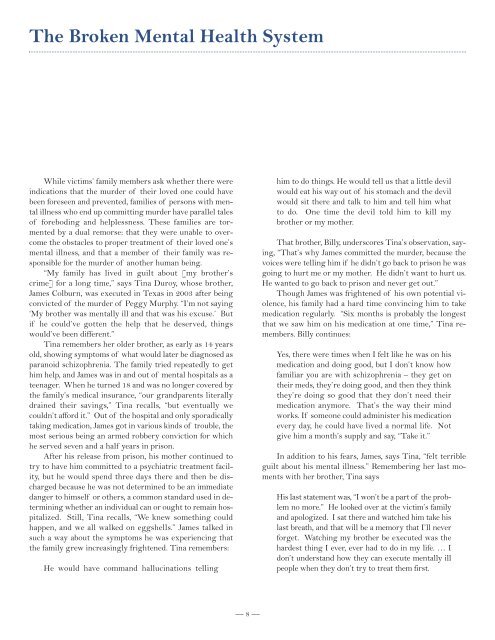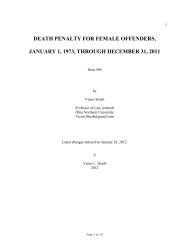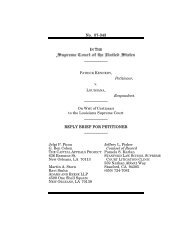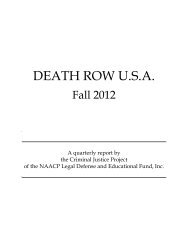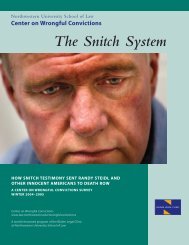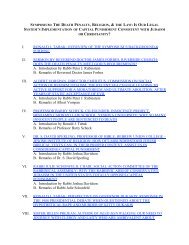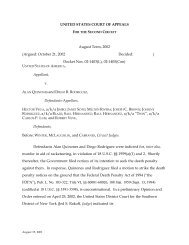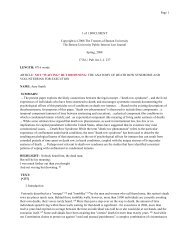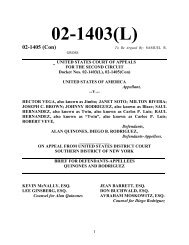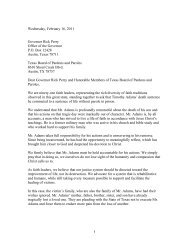AMANDA AND NICK WILCOX’S 19-year-old daughter Laura was killed inCali<strong>for</strong>nia in 2001 by a patient at a behavioral health clinic where she was filling inas a receptionist during her college’s winter break. The man who committed themurder, Scott Thorpe, was later diagnosed with paranoid schizophrenia and wasfound not guilty by reason of insanity and committed to a psychiatric hospital.In their public statement at the launch of the NAMI/MVFHR “Prevention,Not Execution” project, the Wilcoxes said, “Our prisons are now filled with thementally ill and in many instances the only way a person can receive proper mentalhealth care is by committing a crime. The financial resources now spent on implementingthe death penalty would be better spent if redirected to treatment ofthose with serious mental illness, thereby preventing future acts of violence. We had no control over what happened to ourdaughter, but we can choose how we respond. For us, part of that response involves speaking out <strong>for</strong> violence preventionand against the death penalty <strong>for</strong> people with mental illness.”man responsible <strong>for</strong> her husband’s murder had been killedduring the same standoff. “I just thought, what a tragedythat might have been prevented. It was a heartbreak <strong>for</strong>everybody.” Years later, Linda’s greater understanding ofmental illness only underscores <strong>for</strong> her the futility of executionsin such cases:I wish people who were ignorant like [I was be<strong>for</strong>ethis happened] would understand that mental illnessis an illness; people don’t [commit crimes] becausethey want to. When people aren’t able to getthe treatment or the services that they need, theycan become violent. What good is it going to do tokill someone who is not really responsible <strong>for</strong> thedeath? Some people don’t understand why I see itthis way. They say, “Well, they still did it.” Yes, theydid it, but they were ill. That’s what did it, the illness,so if we combat the illness, and educate thepublic, then we’ll be able to help someone insteadof killing them.Victims’ families who did not directly confront the issueof the death penalty in their loved one’s case may still findthemselves called upon to express an opinion about the issue.Art Laffin, whose brother Paul Laffin was stabbed to deathin 1999 by a homeless man as he was leaving the shelterwhere he had worked <strong>for</strong> a decade, explains that althoughthe man responsible <strong>for</strong> the murder was deemed mentallyincompetent to stand trial, “It was a very high-profile caseand if he had been deemed competent to stand trial, he couldhave faced the death penalty. My mother said clearly thatshe would be against such a thing, and I made that clear inmy eulogy, too.” The Laffins learned that Dennis Soutar hadbeen diagnosed with paranoid schizophrenia years be<strong>for</strong>e themurder, and had bounced from shelter to shelter after beingreleased from the hospital. “He fell through the cracks,” ishow Art describes it.Hearing or reading a blanket statement assuming thatall victims’ family members support the death penalty canbe the lever that propels a survivor to express publicly whathad previously been a quietly held belief. Julie Nelson,whose father was murdered by a man who had been diagnosedwith schizophrenia, recalls that she wrote a letter toher city’s newspaper in response to such an article, and shesummarizes her beliefs now by saying, “For me, more killingwouldn’t make it any better. To think that one is somehowgoing to cancel out the other or bring some kind of closureto a tragic event that’s already happened doesn’t make senseto me and seems to go in the wrong direction.”Tom Lowenstein was 10 years old when his father, CongressmanAl Lowenstein, was shot and killed in his office byDennis Sweeney, who had been diagnosed with paranoidschizophrenia. Tom recalls that he felt compelled to expresshis opposition to the death penalty publicly when an opinionpiece in a Boston newspaper asserted that if you oppose thedeath penalty, you don’t care about victims. Tom disagreed,and he thought, “I can’t be the only victim’s family memberwho feels this way, but someone’s got to respond to this.”Pat Webdale puts it this way: “Killing another personnever brings back the person you lost, and it’s like doubledoingthe crime.” Pat traveled to testify against the deathpenalty in her home state of New York, believing “that theyshouldn’t be killed, and especially not if they’re mentally ill;there are extenuating circumstances and I want treatment inthose cases, not an eye <strong>for</strong> an eye.”__ 7 __
The Broken Mental Health SystemWhile victims’ family members ask whether there wereindications that the murder of their loved one could havebeen <strong>for</strong>eseen and prevented, families of persons with mentalillness who end up committing murder have parallel talesof <strong>for</strong>eboding and helplessness. These families are tormentedby a dual remorse: that they were unable to overcomethe obstacles to proper treatment of their loved one’smental illness, and that a member of their family was responsible<strong>for</strong> the murder of another human being.“My family has lived in guilt about [my brother’scrime] <strong>for</strong> a long time,” says Tina Duroy, whose brother,James Colburn, was executed in Texas in 2003 after beingconvicted of the murder of Peggy Murphy. “I’m not saying‘My brother was mentally ill and that was his excuse.’ Butif he could’ve gotten the help that he deserved, thingswould’ve been different.”Tina remembers her older brother, as early as 14 yearsold, showing symptoms of what would later be diagnosed asparanoid schizophrenia. The family tried repeatedly to gethim help, and James was in and out of mental hospitals as ateenager. When he turned 18 and was no longer covered bythe family’s medical insurance, “our grandparents literallydrained their savings,” Tina recalls, “but eventually wecouldn’t af<strong>for</strong>d it.” Out of the hospital and only sporadicallytaking medication, James got in various kinds of trouble, themost serious being an armed robbery conviction <strong>for</strong> whichhe served seven and a half years in prison.After his release from prison, his mother continued totry to have him committed to a psychiatric treatment facility,but he would spend three days there and then be dischargedbecause he was not determined to be an immediatedanger to himself or others, a common standard used in determiningwhether an individual can or ought to remain hospitalized.Still, Tina recalls, “We knew something couldhappen, and we all walked on eggshells.” James talked insuch a way about the symptoms he was experiencing thatthe family grew increasingly frightened. Tina remembers:He would have command hallucinations tellinghim to do things. He would tell us that a little devilwould eat his way out of his stomach and the devilwould sit there and talk to him and tell him whatto do. One time the devil told him to kill mybrother or my mother.That brother, Billy, underscores Tina’s observation, saying,“That’s why James committed the murder, because thevoices were telling him if he didn’t go back to prison he wasgoing to hurt me or my mother. He didn’t want to hurt us.He wanted to go back to prison and never get out.”Though James was frightened of his own potential violence,his family had a hard time convincing him to takemedication regularly. “Six months is probably the longestthat we saw him on his medication at one time,” Tina remembers.Billy continues:Yes, there were times when I felt like he was on hismedication and doing good, but I don’t know howfamiliar you are with schizophrenia – they get ontheir meds, they’re doing good, and then they thinkthey’re doing so good that they don’t need theirmedication anymore. That’s the way their mindworks. If someone could administer his medicationevery day, he could have lived a normal life. Notgive him a month’s supply and say, “Take it.”In addition to his fears, James, says Tina, “felt terribleguilt about his mental illness.” Remembering her last momentswith her brother, Tina saysHis last statement was, “I won’t be a part of the problemno more.” He looked over at the victim’s familyand apologized. I sat there and watched him take hislast breath, and that will be a memory that I’ll never<strong>for</strong>get. Watching my brother be executed was thehardest thing I ever, ever had to do in my life. … Idon’t understand how they can execute mentally illpeople when they don’t try to treat them first.__ 8 __


